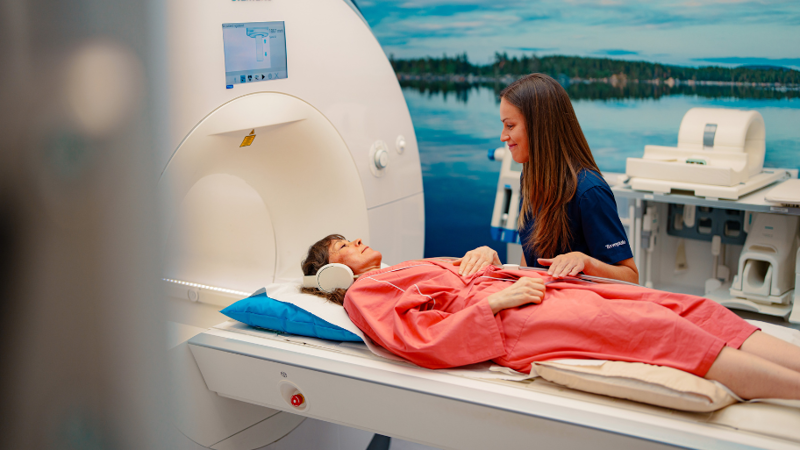Successful management of remote work requires trust
Working remotely has become familiar to even more people during the past year, and it is expected to remain a permanent part of work even after the pandemic. Managing remote work in exceptional circumstances poses challenges: how to take care of your employees’ well-being and work ability remotely, and what kinds of structures does efficient remote or hybrid work require?

In exceptional circumstances, supervisors need to communicate effectively, analyze the exceptional circumstances, make decisions, take risks, and increase the agility and resilience of the organization. Outi Ikonen, Chief Organizational Psychologist at Terveystalo, says that in addition to these operational activities, one key area that needs to be taken into account in managing the prolonged exceptional circumstances and remote work is maintaining and building up trust in the work community.
“We know that there is a clear link between trust and the results achieved by an organization. In studies at the individual level, trust has been linked to, for example, employee satisfaction as well as better performance and effort at work. However, in times of change, trust tends to erode, which means that immediate supervisors should now create practices that build trust to make the organization humanely efficient.”
How can supervisors build trust?
When managing remote work, the supervisor must succeed in creating well-functioning structures for the work. For example, it is useful to hold team meetings on themes related to the development of work, where common goals are clarified and monitoring activities are agreed on.
“Supervisors must make sure that everyone in the team knows what they are supposed to do. The problems of working life are often complex and many of those doing expert work are expected to solve vaguely defined problems. The goal of leadership and supervisory work is to continuously create clarity and provide direction, which increases the psychological safety of team members and, through that, builds up trust in the work community,” Ikonen says.
The psychological safety of the work community is also strongly associated with viewing mistakes and failures as opportunities for shared learning. According to Ikonen, the supervisor’s example of how to talk about failures is key.
“Basically, none of us wants to fail in our work. However, when people are creating, testing and experimenting with something new, mistakes are inevitably made, and these must be seen as an opportunity to learn. If the work community feels that you will be blamed for making a mistake, it will freeze the development of the organization as well as innovation and mutual trust: everyone will be focused on covering their back. In contrast, when mistakes are talked about together and different perspectives and future solutions are presented, mutual trust is strengthened.”
People may feel tired and vulnerable especially in prolonged exceptional circumstances. It is also necessary to create efficient structures for interaction and communication. Team meetings are suitable for some situations, but supervisors should also organize regular one-on-one meetings, as supervisors can build mutual trust by asking how the employee is doing and being proactive in contacting employees and finding solutions for issues related to coping at work. There is also a need for a lot of feedback, especially positive feedback, in remote work. When there are fewer face-to-face meetings, there will be less spontaneous feedback about good performance.
“Active, reciprocal communication is essential in the management of remote work and exceptional circumstances. It is important for supervisors to remember to thank employees and show appreciation. In communication, the importance of listening is also highlighted: starting a conversation without hurrying, asking open questions and validating each other’s ideas builds up mutual trust,” Ikonen says.
If the supervisor feels that trust has been damaged in the work community, the matter should be discussed with the parties involved. Trust in the work community is strengthened when difficult issues can also be discussed.
“The supervisor has a greater responsibility for building and restoring trust than the employee. At the same time, it is important to remember that trust must be mutual. The supervisor is not able to build trust alone,” says Ikonen.
This means that supervisory work in exceptional circumstances involves challenges and problems to be solved. This work becomes easier when you have the necessary information and tools.
If you are interested in our services for organizations, such as coaching packages that support supervisory work in exceptional circumstances, please get in touch!
Contact us to learn more
Latest articles

Terveystalo's digital services have been awarded the internationally recognized ISO27001 information security certification.
Terveystalo's information security practices, processes, and risk management are in line with international best practices.

Does massage help relieve stress? – Touch restores and calms the body and mind
Stress is not always visible on the outside, but the body does show signs when the strain increases. According to Lassi Ylönen, a trained massage therapist at Terveystalo Rela, the body often communicates stress through subtle signs.

Circular economy and artificial intelligence boost performance and improve care
At the heart of sustainable healthcare, technology serves as a tool for improving both the quality of care and accountability. Terveystalo favors solutions that combine sustainability, cost-effectiveness, and medical expertise.

Psychologist: How to make Christmas a relaxed and personal celebration
For many, the anticipation of Christmas begins when cities are decked out in seasonal lights and the first chocolates, calendars, and gingerbread cookies appear on store shelves. Christmas carols ring out and the Tonttuparaati choir sings “Kiire jo on! Kiire jo on!” (Hurry up! Hurry up!). This warm and atmospheric celebration also brings other feelings to mind: how on earth can we get through all this without losing our joy and peace in the rush?

Terveystalo and Gosta Labs deepen their cooperation: the goal is to streamline work with a superior patient information system
Terveystalo is deepening its cooperation with Finnish health technology company Gosta Labs and investing €1 million in the company as a minority investor. The aim is to jointly develop artificial intelligence solutions that improve the quality of care and the efficiency of reception work as part of Terveystalo's new patient information system, Terveystalo Ella.

First aid preparedness in companies requires action and courage
First aid skills increase resilience, but a barometer survey of Finnish organizations' first aid capabilities published in October reveals that the number of trained personnel is alarmingly low.